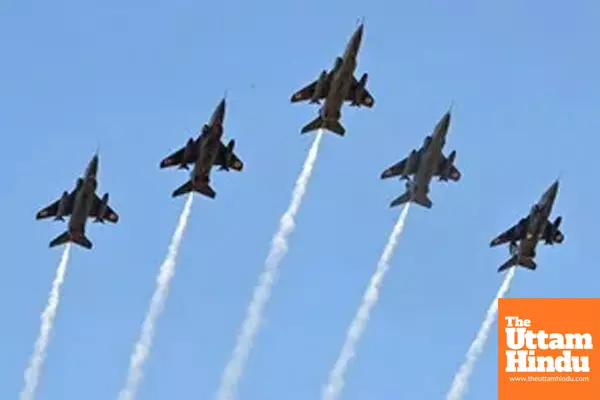
New Delhi (The Uttam Hindu) : After the terrorist attack in Pahalgam, tensions between India and Pakistan have increased significantly. India carried out air strikes on 9 terrorist bases in Pakistan and PoK under 'Operation Sindoor', in which no civilian or military base was targeted. In response to this, Pakistan is continuously attacking Indian military and civilian bases. Global concerns have also increased over the tension between the two nuclear powers.
Pakistan has threatened to use nuclear bombs against India several times if any action is taken. In the current situation, Pakistan is continuously attacking India with drones, missiles in airfields and is also firing unprovoked from across the border. The Indian Army is continuously taking effective retaliatory action and Pakistan is being given a befitting reply.
On Saturday too, Pakistan carried out attacks in many areas of India. In response to the aggressive attitude adopted by Pakistan on India's western border and LoC, the Indian Army launched a massive attack on many important military installations of Pakistan. The places that were targeted included the technical centers, command centers, radars and large ammunition depots of the Pak Army.
Meanwhile, the US has urged both nuclear-armed neighbours to start a dialogue and reduce the rising tensions. Pakistan Prime Minister Shahbaz Sharif is reported to have called a meeting of the National Command Authority on Saturday. The National Command Authority is the highest body of civil and military officials, which takes decisions related to the security of the country, including decisions related to nuclear weapons. However, later Pakistan's Defense Minister clarified that no such meeting has been scheduled.
India and Pakistan are among the most densely populated areas of the world. The use of nuclear bombs here can cause unimaginable destruction of life and property. Amidst all the apprehensions, it is believed that both the countries would like to avoid extreme situations like using nuclear bombs.
According to sources, Pakistani Foreign Minister Mohammad Ishaq Dar says that if India stops the attacks, we will also consider stopping the attacks. However, Pakistan, like India, is not bound by the commitment of not using the nuclear bomb first. On the other hand, India's stand is clear that if Pakistan dares to do anything like this, it will be taught a tough lesson. India and Pakistan have always been in discussions in terms of their military power. According to the report of The Military Balance 2024, International Institute for Strategic Studies- Yearbook 2024, Stockholm International Peace Research Institute, there is a big difference in the military strength of the two countries. India has 14.8 lakh active military personnel, while Pakistan has 6.6 lakh personnel. India's army consists of 12,37,000 soldiers, 1,49,900 Air Force personnel, 75,500 Navy personnel and 13,350 Coast Guard. On the other hand, Pakistan has 5,60,000 soldiers in its army, 70,000 air force personnel and 30,000 naval personnel. It is clear that India has more than double the number of active military forces than Pakistan.
India also dominates in ground power. India has 9,743 artillery and 3,740 main battle tanks, while Pakistan has 4,619 artillery and 2,537 tanks. This difference further strengthens India's ground power. India has 730 fighter planes in the Air Force, while Pakistan has 452 planes. This difference gives India an edge in air warfare. However, according to this report, both countries are almost equal in terms of nuclear power. India has 172 nuclear weapons, while Pakistan has 170 weapons.
